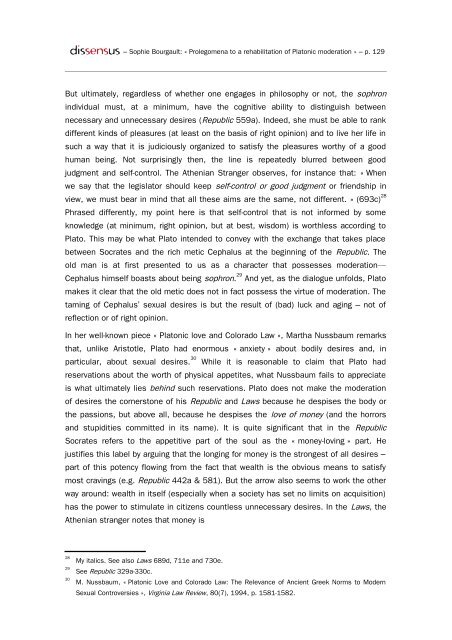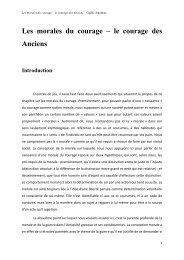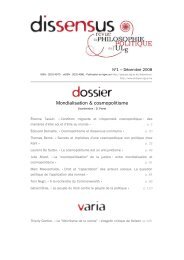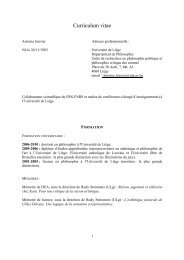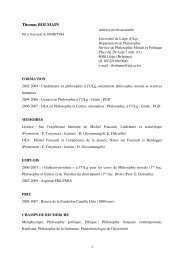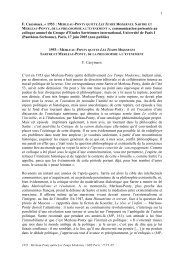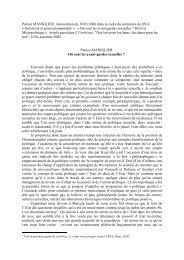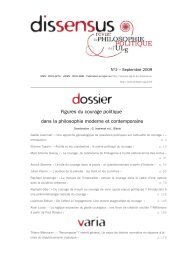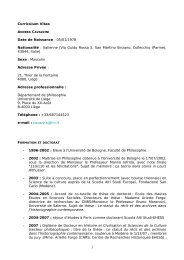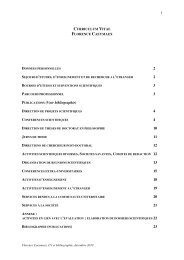Subjectivations politiques et économie des savoirs - Service de ...
Subjectivations politiques et économie des savoirs - Service de ...
Subjectivations politiques et économie des savoirs - Service de ...
Create successful ePaper yourself
Turn your PDF publications into a flip-book with our unique Google optimized e-Paper software.
– Sophie Bourgault: « Prolegomena to a rehabilitation of Platonic mo<strong>de</strong>ration » – p. 129<br />
But ultimately, regardless of wh<strong>et</strong>her one engages in philosophy or not, the sophron<br />
individual must, at a minimum, have the cognitive ability to distinguish b<strong>et</strong>ween<br />
necessary and unnecessary <strong><strong>de</strong>s</strong>ires (Republic 559a). In<strong>de</strong>ed, she must be able to rank<br />
different kinds of pleasures (at least on the basis of right opinion) and to live her life in<br />
such a way that it is judiciously organized to satisfy the pleasures worthy of a good<br />
human being. Not surprisingly then, the line is repeatedly blurred b<strong>et</strong>ween good<br />
judgment and self-control. The Athenian Stranger observes, for instance that: « When<br />
we say that the legislator should keep self-control or good judgment or friendship in<br />
view, we must bear in mind that all these aims are the same, not different. » (693c) 28<br />
Phrased differently, my point here is that self-control that is not informed by some<br />
knowledge (at minimum, right opinion, but at best, wisdom) is worthless according to<br />
Plato. This may be what Plato inten<strong>de</strong>d to convey with the exchange that takes place<br />
b<strong>et</strong>ween Socrates and the rich m<strong>et</strong>ic Cephalus at the beginning of the Republic. The<br />
old man is at first presented to us as a character that possesses mo<strong>de</strong>ration—<br />
Cephalus himself boasts about being sophron. 29 And y<strong>et</strong>, as the dialogue unfolds, Plato<br />
makes it clear that the old m<strong>et</strong>ic does not in fact possess the virtue of mo<strong>de</strong>ration. The<br />
taming of Cephalus’ sexual <strong><strong>de</strong>s</strong>ires is but the result of (bad) luck and aging – not of<br />
reflection or of right opinion.<br />
In her well-known piece « Platonic love and Colorado Law », Martha Nussbaum remarks<br />
that, unlike Aristotle, Plato had enormous « anxi<strong>et</strong>y » about bodily <strong><strong>de</strong>s</strong>ires and, in<br />
particular, about sexual <strong><strong>de</strong>s</strong>ires. 30<br />
While it is reasonable to claim that Plato had<br />
reservations about the worth of physical app<strong>et</strong>ites, what Nussbaum fails to appreciate<br />
is what ultimately lies behind such reservations. Plato does not make the mo<strong>de</strong>ration<br />
of <strong><strong>de</strong>s</strong>ires the cornerstone of his Republic and Laws because he <strong><strong>de</strong>s</strong>pises the body or<br />
the passions, but above all, because he <strong><strong>de</strong>s</strong>pises the love of money (and the horrors<br />
and stupidities committed in its name). It is quite significant that in the Republic<br />
Socrates refers to the app<strong>et</strong>itive part of the soul as the « money-loving » part. He<br />
justifies this label by arguing that the longing for money is the strongest of all <strong><strong>de</strong>s</strong>ires –<br />
part of this potency flowing from the fact that wealth is the obvious means to satisfy<br />
most cravings (e.g. Republic 442a & 581). But the arrow also seems to work the other<br />
way around: wealth in itself (especially when a soci<strong>et</strong>y has s<strong>et</strong> no limits on acquisition)<br />
has the power to stimulate in citizens countless unnecessary <strong><strong>de</strong>s</strong>ires. In the Laws, the<br />
Athenian stranger notes that money is<br />
28<br />
29<br />
30<br />
My italics. See also Laws 689d, 711e and 730e.<br />
See Republic 329a-330c.<br />
M. Nussbaum, « Platonic Love and Colorado Law: The Relevance of Ancient Greek Norms to Mo<strong>de</strong>rn<br />
Sexual Controversies », Virginia Law Review, 80(7), 1994, p. 1581-1582.


